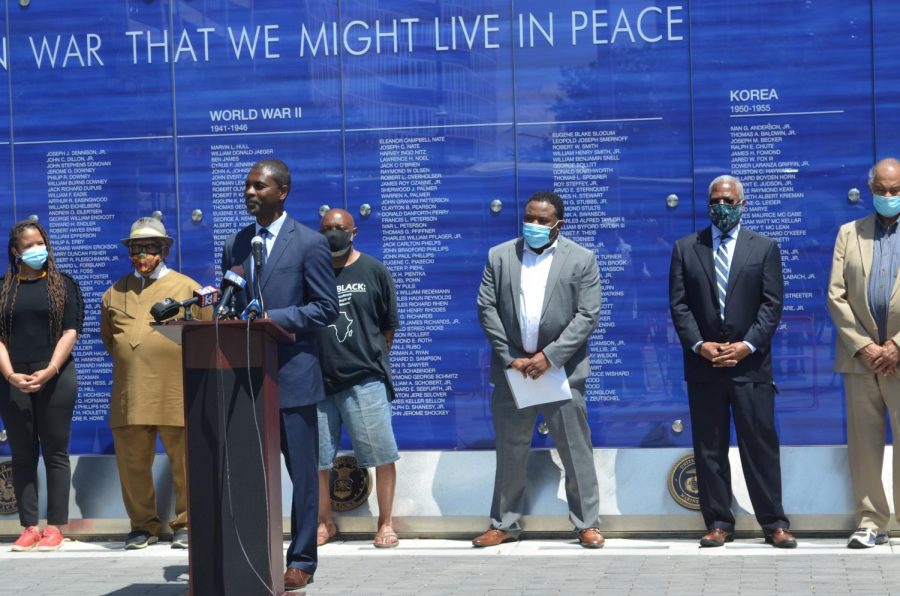State Rep. La Shawn Ford, Evanston community discuss anti-racism in K-12 education
Binah Schatsky/The Daily Northwestern
State Rep. La Shawn Ford (D-Chicago) in front of the war memorial at Fountain Square in Evanston at 11am Thursday. The press conference raised awareness for his bill addressing systemic racism in Illinois K-12 education, which emphasizes teaching black history as vibrant and essential to American history.
June 25, 2020
State Rep. La Shawn Ford (D-Chicago) and Evanston community leaders advocated for a bill at a Thursday press conference that could address systemic racism in Illinois K-12 education.
HB4954, sponsored by Ford, amends the Illinois School Code on several accounts including mandating black history. An amendment, authored by Evanston resident and advocate Meleika Gardner, calls for adding pre-enslavement content to the black history canon.
The amended bill was brought before the Illinois House Committee in March and passed with 14 in favor and seven opposed. Ford held the conference in Fountain Square to raise awareness for the legislation ahead of the second House reading.
“One of the reasons we celebrate Black History Month is because this nation knows that we’re not teaching black history,” Ford said, calling the bill “the most important bill we could pass in Illinois.”
Gardner and Ford were joined by Ald. Robin Rue Simmons (5th), Evanston/Skokie School District 65 Superintendent Devon Horton, Evanston/North Shore NAACP President Michael Nabors, and other community advocates who all spoke in favor of Ford’s bill.
The conclusions were consistent across the board, emphasizing black history as a crucial piece of American history and a tool for combating systemic racism. Horton, who joined the district earlier this month, said that this history is currently inaccessible.
“True racism continues to live in our educational institutions,” Horton said. “White supremacy is learned behavior from what is taught in our history books.”
Simmons, who has spearheaded the push for reparations in Evanston, called education “a key piece of what repair looks like.” Acknowledging the recent Black Lives Matter protests and nationwide “awakening” to the oppression black people face, she said “now is the time” to fight for this bill.
The bill calls for a curriculum highlighting the contributions and vibrance of ancient black civilizations, as well as the traumas of slavery and fight for civil rights.
“We need to change how black people are viewed in this country,” Gardner said.
Gardner, the creator of Evanston Live TV, became involved with the bill through Women Empowering Women in Local Legislation, also known as WE WILL, of which she is now a board member. When Gardner shared her ideas for expanding the teaching of black history, WE WILL connected her with Rep. Ford.
WE WILL President Erika Walker said the organization fully supports the bill and a renewed effort to emphasize black history.
“As you look at some of the violence and hopelessness that takes place in black communities, part of that is that we don’t know our history,” Walker said. “If you know who you are you have a greater sense of pride.”
At the press conference, Gardner called for people to contact their House representatives and put pressure on them to support the bill and be “on the right side of history.”
“We have to stop the miseducation of who people are in history,” Gardner said. “At the end of the day, it’s really a crime.”
Email: [email protected]
Twitter: @BinahSchatsky
Related Stories:
— Initiative for pre-enslavement black history education gains traction


